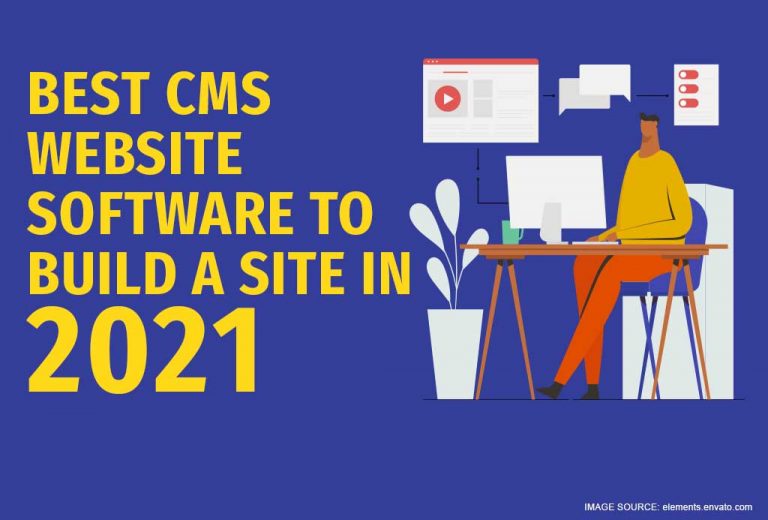Last updated: Apr, 2024
In this guide, you’ll learn more about the most popular CMS website software, but you’ll also learn about some software you’ve probably never heard of. (All web hosting plans at MonsterHost are optimized to work for different CMS website software, so you can feel free to explore!)
Before we get into the list, let’s make sure we’re on the same page:
Table of Contents
What’s CMS website software?
CMS stands for Content Management System, and as its name suggests, it’s a system that’s designed to help you manage the content you create on your website. If CMS website software didn’t exist, you wouldn’t be able to create your website unless you knew how to code. A CMS lets you add content to a simple editor, then it turns your content into a working website.
Now that you know what a CMS website software is, here are the best ones for 2024.
5 best CMS website software to build a site in 2024
1. WordPress
WordPress is the most popular CMS website software. One in three websites on the internet is powered by WordPress.
There are lots of reasons why WordPress is so popular:
- It’s free and open source.
- WordPress’s interface is friendly and intuitive, which makes it arguably the easiest CMS to use.
- WordPress has a massive community with millions of members. So, if you run into a problem using WordPress, you can always find help.
- WordPress’s developers take security seriously, and you can expect an update about once every two months.
- There are tens of thousands of WordPress plugins that enhance the functions of your website.
- You can also find thousands of themes to customize the design of your website.
2. Drupal
Another popular open-source CMS – Drupal, is often discussed in the same breath as WordPress. Drupal is the third most popular CMS, and it also offers tons of features that are designed to make it more flexible. It’s flexible taxonomy system makes it great for managing sites with a lot of content. Its built-in user access system also gives you lots of control over what you can do with it.
If you’re a developer, you’ll love Drupal, because you can make it highly customized if you’re comfortable working with HTML and PHP. But if you’re a beginner, you might actually be put off by the more developer-centered nature of Drupal.
Like WordPress, though, Drupal lets you customize your site’s design and function by using themes and modules.
3. Joomla
Joomla is the second most popular CMS website software. Like WordPress, Joomla offers thousands of templates and extensions to help you create a website that’s perfectly suited to your needs.
Joomla is not as easy to use as WordPress, because like Drupal, it does expect you to be fairly comfortable with HTML and PHP if you want more control over your website’s design and functions.
Nevertheless, here’s why users love Joomla:
- Joomla has powerful, optimized SEO tools right out of the box.
- Its template manager helps you visually manage installed templates.
- Joomla is free and open source.
- With two-factor authentication and extensive access control levels, Joomla’s security system is robust enough for big companies and government websites.
4. Magento
Magento is an open-source CMS website software for eCommerce stores. This eCommerce platform gives you tons of out-of-the-box features that let you craft a unique and engaging shopping experience for your customers. Magento also boasts a flexible headless architecture, and seamless third-party integrations.
Magento has great security features, but you should know that it’s not very intuitive for non-technical users. So, if you want to set it up, you’ll either need to hire an IT person or take some time to learn the software yourself.
5. Umbraco CMS
Umbraco has been around for about ten years now, and it has a growing community of over 200,000 developers around the globe. It is a flexible CMS website software that lets you build an editing experience that’s perfectly optimized for your content editors’ needs.
Like all the other CMS on our list, Umbraco is also free and open source, so you don’t need to worry about price.
And Umbraco’s community is filled with people who are friendly, pro-active, and insanely talented. So, if you’re willing to give a smaller CMS website software a try, go ahead and see if Umbraco is what your website needs.
If you’ve made it this far in the guide and you’re still not sure that you want to use any CMS website software at all, there’s a great alternative we haven’t mentioned.
The alternative to CMS website software: A website builder!
A website builder has templates that you can tweak to create a beautiful website in minutes. This is a great alternative to CMS website software, because even complete beginners can use a website builder. You don’t need to know how to code at all. So, you can use a website builder to create a unique website without knowing how to use HTML or PHP! Our website builder features drag-and-drop technology that makes it perfect for beginners who want to create a website that looks like it was professionally designed.
Wrapping up
2024 is the perfect time to create a website. The developer communities for CMS website software are bigger than ever, so you can trust that if you ever run into a problem with your CMS, you can easily get help. And if you don’t want to bother with using a CMS at all, you can even use a website builder!






